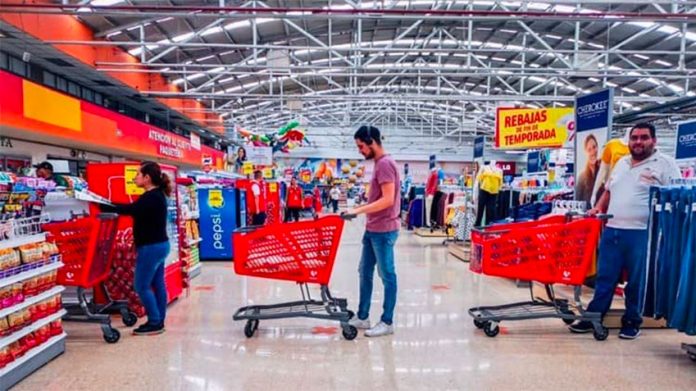Physical distancing efforts may be visible on the streets of Mexico City where there is significantly less car and pedestrian traffic than usual, but efforts to mitigate the spread of Covid-19 have not been as successful in the city’s busy supermarkets.
The government recommends people keep “a healthy distance” between themselves and others when carrying out essential business in public.
But reporters from the newspaper Reforma found that both shoppers and stores were doing little to heed the counsel — some taking no measures whatsoever — when they visited several supermarkets in the capital on Thursday.
They found lines as long as 15-20 carts in some Bodega Aurrera supermarkets, where shoppers made little effort to maintain their distance.
Some complained on social media of the company’s failure to implement preventative health measures.
“At Bodega Aurrera we have an internal contingency plan … and we have reinforced prevention measures and hygiene in our stores in order to safeguard the wellbeing and safety of Mexican families,” the store responded.
Other chains, like Walmart and La Comer, took measures like providing antibacterial hand gel to customers, establishing points of distance between shoppers in the lines and installing plastic shields at the cash registers.
The reporters observed that all the stores they visited were lacking products like hand sanitizer and latex gloves, but they also saw shortages of other items not necessarily essential to the prevention of spreading Covid-19.
Among them were alcoholic beverages — as people stock up before brewers stop making and selling beer — as well as vitamins, dietary supplements and medicines for the treatment of cold symptoms, cough, inflammation, menstrual pains and parasites, among others.
Two branches of the Soriana chain were out of products such as candles, pet shampoo, plastic bags and aluminum foil.
Products they found in all of the stores they visited included hand and body soap, detergents, toilet paper, cereals and canned foods.
The reporters found that the busiest hours were between 5:00 p.m. and 7:00 p.m., when they observed very long lines in which people did not follow the government’s “healthy distance” recommendations.
Source: Reforma (sp)
